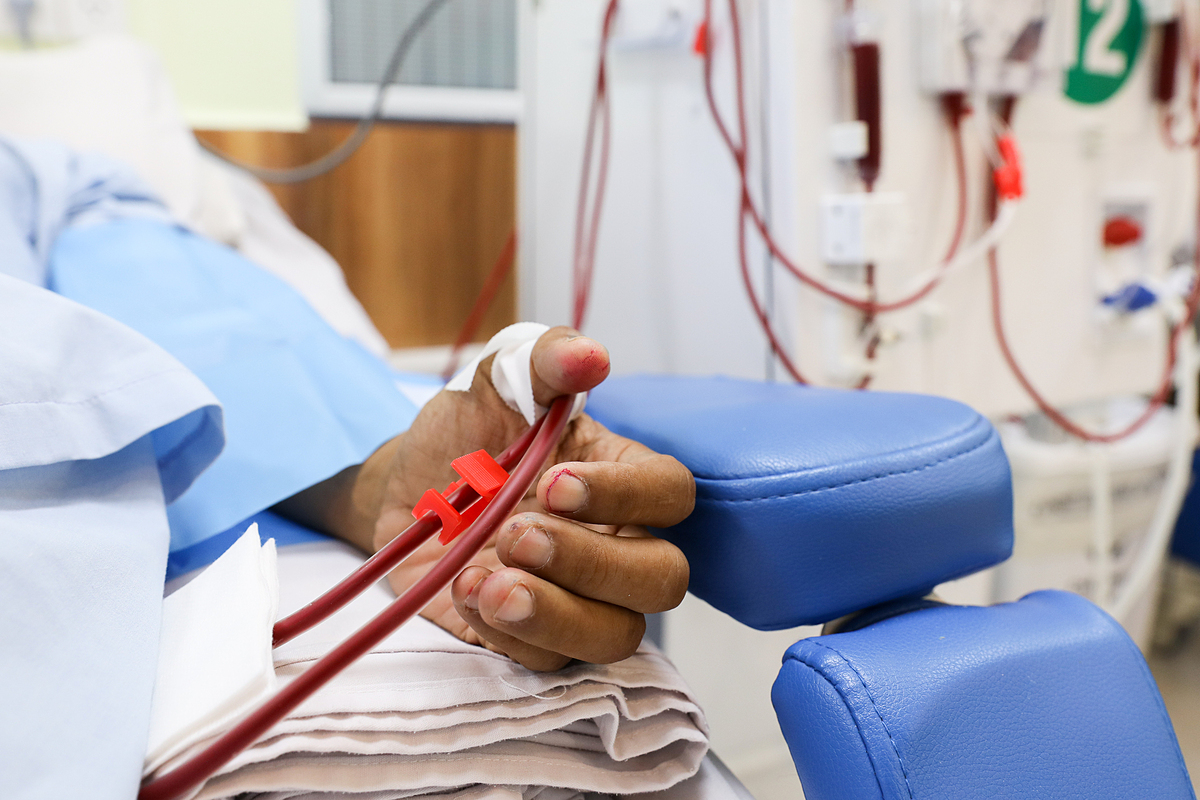"My world fell apart," he recalls about the day he received the diagnosis a year ago.
Previously healthy and young, Ha hadn't prioritized regular health checkups due to financial constraints. During the 2021 Covid-19 outbreak, he received a vaccine and discovered he had high blood pressure. He didn't seek treatment, assuming he was healthy and it wasn't serious. When dizziness, blurred vision, and swelling finally led him to the hospital, doctors diagnosed him with end-stage kidney disease and retina damage from the untreated hypertension.
After emergency dialysis, Ha now requires the treatment three times a week, costing several million dong monthly even with health insurance. Without a kidney transplant from a living or deceased donor, he faces lifelong dialysis, impacting holidays and celebrations. The financial burden falls heavily on his wife, who cares for their young child and sells vegetables at the market. Fortunately, her unwavering support has helped him overcome negativity and learn to live with the disease.
Nguyen Bach, Head of the Artificial Kidney Department at Thong Nhat Hospital, explains that with regular checkups, chronic kidney disease can be detected in stages 1 through 4. While incurable, early detection allows for treatment to slow progression, manage symptoms, and maintain a better quality of life. In end-stage kidney disease, like Ha's, dialysis becomes the only option to prolong life.
"Alarmingly, many young people first present with end-stage chronic kidney disease, requiring lifelong dialysis," Dr. Bach states, noting the hospital's overwhelming number of such patients.
 |
Dialysis patients at Thong Nhat Hospital. Photo: Phung Tien |
Dialysis patients at Thong Nhat Hospital. Photo: Phung Tien
The number of young adults aged 20 to 40 diagnosed with end-stage kidney disease has risen in recent years. At Binh Dan Hospital's Nephrology Department, doctors report that approximately 33% of their patients are under 40. Many cases in this age group are linked to uncontrolled medication use or glomerular diseases like IgA nephropathy and lupus. Uncontrolled hypertension also plays a role, damaging blood vessels, reducing blood flow to the kidneys, and ultimately causing kidney failure.
Le Thi Dan Thuy, Head of the Nephrology and Dialysis Department at Binh Dan Hospital, describes patients unaware of their high blood pressure or who dismissed it as harmless, only to regret their inaction when diagnosed with kidney disease. They realize that managing their blood pressure could have prevented this outcome.
Kidney disease often progresses silently, making early detection difficult. Symptoms like swelling, fatigue, pale or dark skin, frequent urination in small amounts, poor sleep, and high blood pressure typically appear in later stages. Decreased kidney function can also impair blood pressure regulation, leading to hypertension.
"Symptoms often indicate late-stage kidney disease. Early screening could significantly reduce the number of people progressing to end-stage renal failure," says Dr. Bach.
In developed countries, kidney disease typically affects people aged 60 and older due to age-related hypertension and diabetes. In Vietnam, this burden extends to younger patients with end-stage renal disease, primarily caused by glomerular diseases. Countries like Japan have implemented school-based screening programs for these conditions, successfully reducing kidney disease among young people.
Doctors recommend drinking plenty of water, starting with a 300 ml glass upon waking, to promote kidney health. A healthy diet, low in salt, regular exercise, avoiding stimulants, not smoking, and limiting alcohol consumption are also crucial. Self-medicating with herbal remedies or medications without understanding their ingredients and potential impact on kidney function should be avoided.
Regular health checkups are essential for early detection and treatment, preventing progression to end-stage kidney disease. Seek immediate medical attention if you experience symptoms like swelling, frequent nighttime urination, headaches, or high blood pressure. Managing pre-existing conditions like hypertension and diabetes is crucial to prevent complications like kidney failure and stroke.
Families with a history of kidney disease or IgA nephropathy should undergo kidney function tests, including urine and blood protein levels, for early detection and intervention. Annual urine tests for kidney disease are recommended and cost approximately 150,000 dong.
"This is an affordable cost compared to the substantial financial and health burden of dialysis in later stages," advises the doctor.
Le Phuong












